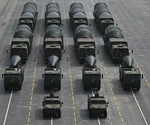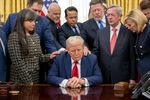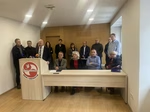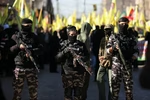Opposition thrilled about potential US involvment in Bosnia

While opposition leaders hail the return of a stronger presence of the United States in Bosnia’s politics, analysts think it should not be taken too seriously.
Oglas
After the EastWest Institute published its report analysing the situation in the Western Balkans region on Thursday, opposition leaders have been talking about the US "waking up" and finally getting involved.
“The US along with the EU should encourage Bosnia’s party leaders to negotiate a new election law. Should they fail to reach an agreement, the High Representative should use his powers to intervene, to include drafting and promulgating a law on behalf of the Bosnian entities,” said the report, created in cooperation with the National Committee on American Foreign Policy.
According to one of Bosnia's lawmakers and opposition party leaders involved in the Election Law negotiations, Zeljko Komsic, it is good that the US is getting involved. He said it is a counter to Russian involvement in the country.
Oglas
Russia has seen an opportunity to enter Bosnia and install it's political interests, he said, adding that the same is visible in Serbia, Croatia and Montenegro.
"So, this reaction (by the US) is in my opinion coming somewhat late, I hope not too late, but it is totally logical," Komsic said.
Lawmaker Dennis Gratz said it is a good thing that the US has "finally woken up", especially in an election year. He said he does not believe sanctions are the best solution, but they should not be ignored as an option.
"I am not sure that imposing anything is an option that would help Bosnia be recognized as independent and sovereign," he said.
Oglas
"As long as things are imposed by actors such as the Office of the High Representative (OHR), it speak about how dependent we are," he added.
But political analyst Zlatko Hadzidedic is approaching the matter with caution. He pointed out that the decision-making process in the United States has multiple layers.
"It depends on what the State Department proposes, how the White House sees it, whether the Pentagon will agree, and whether the Congress will green-light it," he explained.
"This is why I don't think a lot of importance should be given to this. I see it as a continuity," Hadzidedic said.
Oglas
Experts said it is unclear what kind of policy US State Secretary Mike Pompeo, who is close to President Donald Trump, will lead in regard to the region.
Kakvo je tvoje mišljenje o ovome?
Učestvuj u diskusiji ili pročitaj komentare
Oglas
Kakvo je tvoje mišljenje o ovome?
Učestvuj u diskusiji ili pročitaj komentare
Oglas





 Srbija
Srbija
 Hrvatska
Hrvatska
 Slovenija
Slovenija



























































